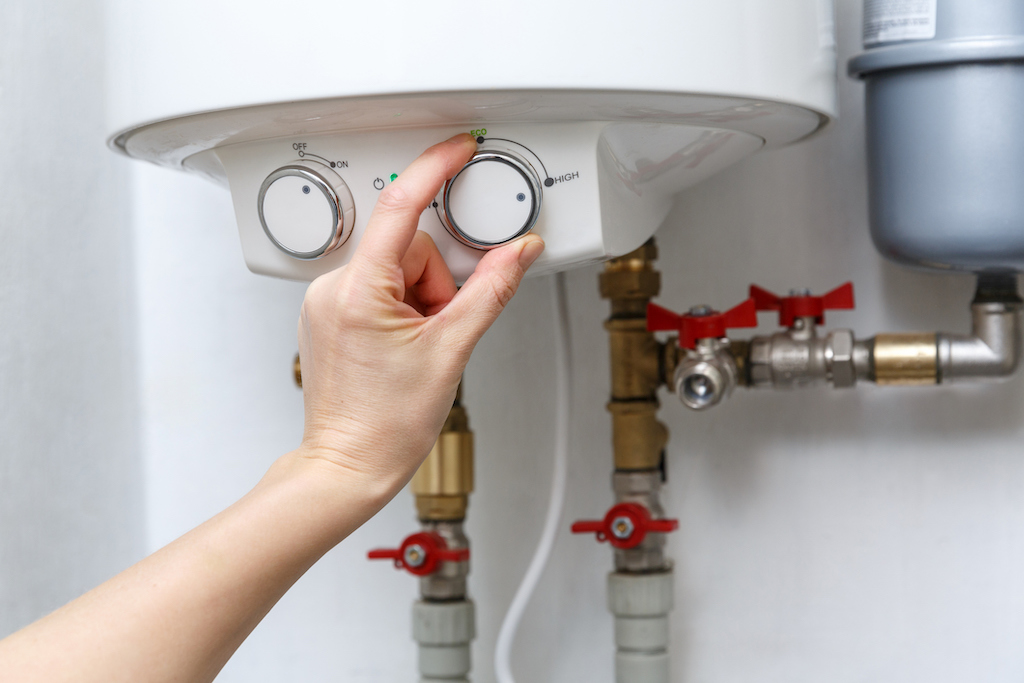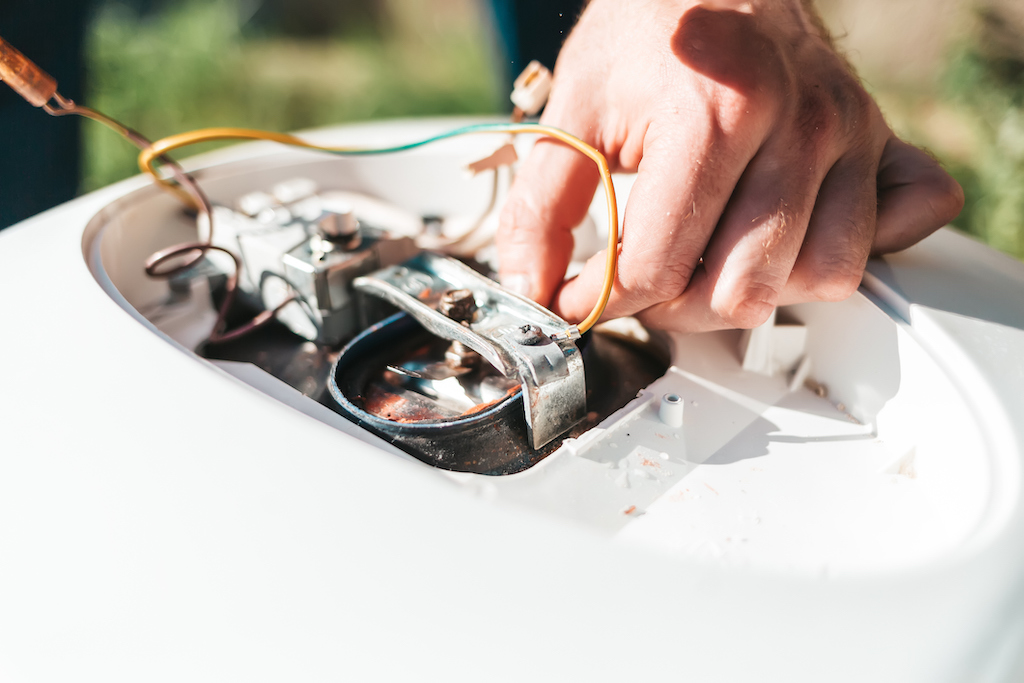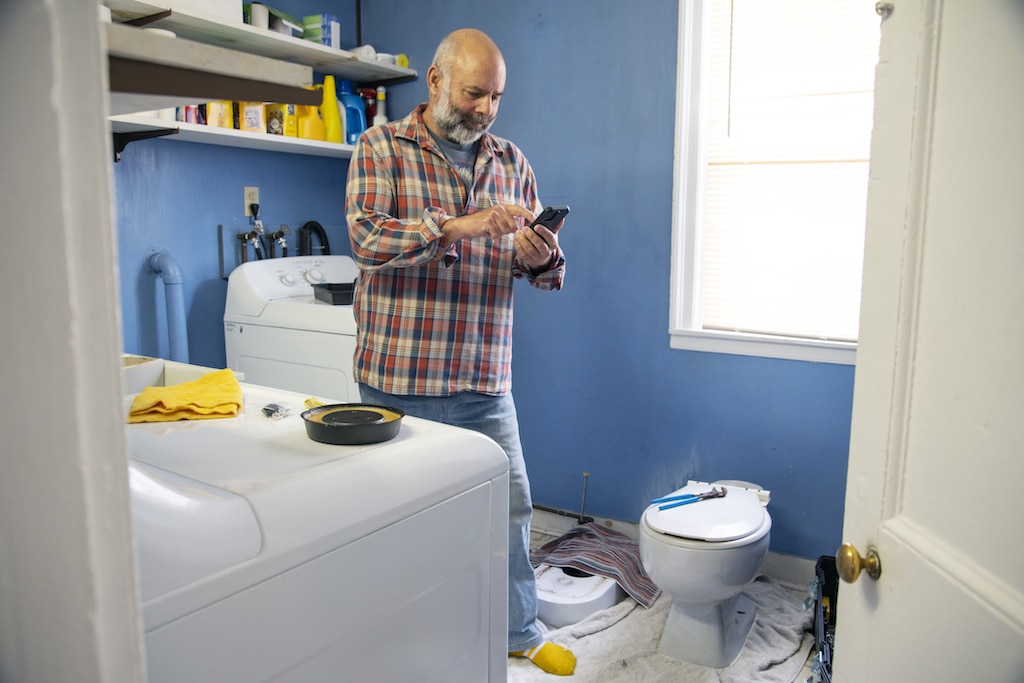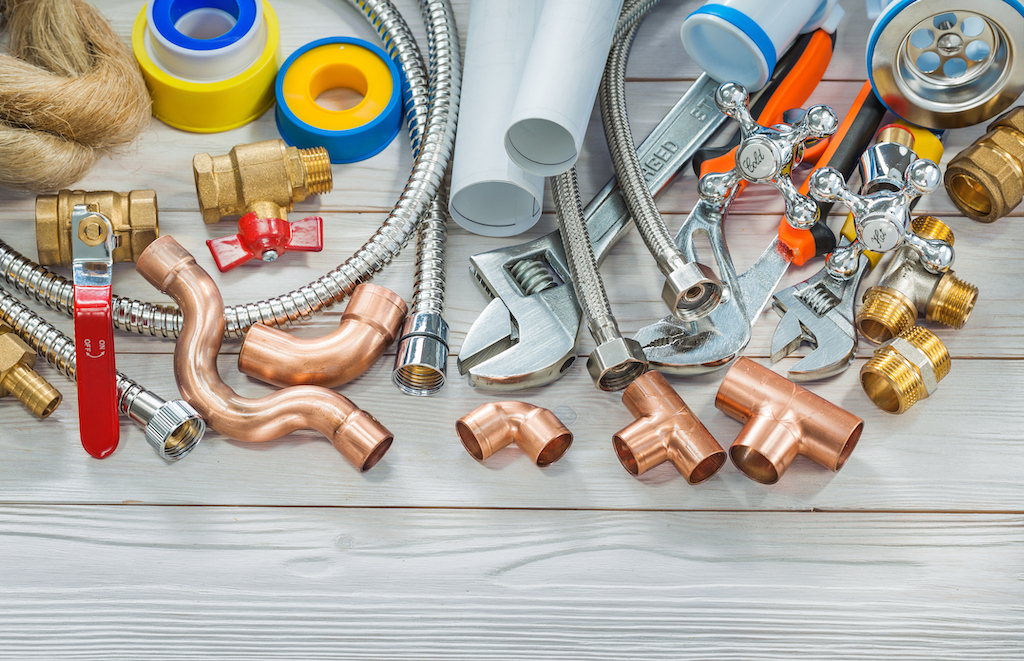
Quick Fix: Tankless Water Heater Repair Guide
You’ve just come home from a long day at work, and all you’re looking forward to is a soothing, hot shower.
But as fate would have it, you’re met with a chilly surprise. Your tankless water heater, which you’ve taken for granted, has suddenly become the source of an unexpected cold spell in your home.
Tankless water heater repair might not be your forte, but it’s crucial to address the issue promptly to restore your home’s comfort.
In this article, we’ll guide you through the ins and outs of tankless water heater repair. You’ll learn how to identify common problems, perform basic repairs, and when to call in the professionals.
We’ll also share maintenance tips to prevent future issues and discuss the latest advancements in tankless water heating technology.
By the end, you’ll be equipped with the knowledge to handle your tankless water heater’s ups and downs with ease.
What is Tankless Water Heater Repair?
Tankless water heater repair is the process of troubleshooting and resolving issues within your on-demand water heating system.
Unlike traditional units, tankless heaters provide hot water directly through heating coils without storing it. When they malfunction, repairs can range from simple filter cleaning to more complex valve replacements.
When you encounter a glitch in your tankless water heater, it’s not just the absence of hot water that’s alarming—it’s also the disruption of your daily comfort and routine.
Tankless water heater repair encompasses a range of actions from diagnosing minor issues that you can fix yourself to understanding when it’s time to call in a professional.
Unlike their bulky predecessors, tankless water heaters are designed to heat water on demand, directly passing it through an array of heating elements. This means no storage tank and no standby heat loss, making them more energy-efficient.
But this efficiency comes with its own set of complexities. When a tankless system starts to fail, it could be due to a variety of reasons such as mineral buildup, ignition failure, or even a simple electrical hiccup.
The repair process begins with identifying the problem. Is your water heater failing to ignite?
Is it providing water that’s not hot enough, or is the flow inconsistent?
Each symptom can lead to a different path of troubleshooting. For instance, if you’re facing ignition issues, the cause could be as simple as a tripped breaker or as complex as a failed control board.
On the other hand, fluctuating water temperatures often point to mineral buildup around the heating elements or in the pipes.
Simple maintenance tasks like cleaning or replacing the air filter, checking gas pressure, or ensuring proper ventilation can sometimes resolve the issue without the need for extensive repairs. However, more complex problems such as a malfunctioning thermostat, a broken heat exchanger, or a damaged flow sensor typically require professional intervention.
Understanding tankless water heater repair also involves recognizing the importance of regular maintenance.
By descaling the heating elements annually, checking for error codes, and keeping an eye on the system’s performance, you can often prevent the need for repairs.
It’s about being proactive rather than reactive, ensuring that your tankless water heater continues to provide that stream of hot water whenever you need it.
Tankless water heater repair is about maintaining the balance between efficiency and functionality. It’s about ensuring that this modern convenience doesn’t turn into a modern hassle.
With the right approach and knowledge, you can ensure that your tankless water heater serves you well for years to come.
Also read: The Ultimate Guide To Hiring A Bathroom Plumber: Everything You Need To Know

Photo By Ildar Abulkhanov at iStock
Understanding Your Tankless Water Heater
Embarking on the journey of tankless water heater repair begins with a solid understanding of how your system operates.
Unlike traditional tank heaters that store and continuously heat water, tankless models use high-powered burners to rapidly heat water on demand as it flows through a heat exchanger.
This process is not only more energy-efficient but also provides the convenience of never running out of hot water—as long as the system is functioning correctly.
The Mechanics Behind the Heat
At the heart of your tankless water heater is the heat exchanger. It’s a series of coils that have the crucial job of transferring heat to the water.
When you turn on a hot water tap, a flow sensor activates the burners, which then heat the coils. As water passes over these hot coils, it absorbs heat, reaching the temperature set on your unit’s thermostat.
Fuel Sources and Venting
Tankless water heaters can be powered by electricity, natural gas, or propane. Gas-powered models typically heat water faster and are more suitable for larger households.
They require proper venting to expel exhaust gasses—a critical aspect of both performance and safety.
Electric models, while generally more compact and easier to install, may require significant electrical work to ensure they have the power necessary to perform efficiently.
They are often chosen for smaller homes or for point-of-use applications, such as a single bathroom or kitchen.
Capacity and Flow Rates
Understanding your heater’s capacity and flow rate is crucial.
The flow rate, measured in gallons per minute (GPM), determines how much hot water the heater can deliver. If you have a high demand for hot water—say, running the dishwasher while someone is showering—you’ll need a tankless heater with a higher GPM rating.
Maintenance Matters
Maintenance is key to the longevity and efficiency of your tankless water heater.
Hard water, with high mineral content, can cause scale, which may clog the heating elements. Regular descaling, especially in areas with hard water, is essential to prevent this.
Filters should be cleaned or replaced regularly to keep the unit from overworking.
Smart Technology Integration
Many modern tankless water heaters come with smart technology features, allowing you to monitor and control your system remotely.
These systems can provide diagnostic codes and alerts that help in troubleshooting and can even remind you when it’s time for routine maintenance.
The Importance of Sizing
One of the most critical aspects of understanding your tankless water heater is ensuring it’s the right size for your home.
An undersized unit will lead to a never-ending cycle of frustration and inefficiency, as it struggles to meet the hot water demands. Conversely, an oversized unit can lead to wasted energy and increased operational costs.
Your tankless water heater is a complex balance of efficiency, capacity, and technology.
Understanding these elements is the first step in ensuring that when something goes wrong, you’re equipped with the knowledge to identify the issue or to communicate effectively with a professional for tankless water heater repair.
Regular maintenance and a keen eye for changes in performance can go a long way in preventing disruptions in your hot water supply.
Also read: Reasons To Make The Switch To Rheem Tankless Water Heaters
Common Tankless Water Heater Problems
Navigating the complexities of tankless water heater repair starts with recognizing the common issues that might arise.
These units are praised for their efficiency and convenience, but like any appliance, they’re not immune to problems.
Here’s a rundown of typical troubles you might encounter and what they could indicate about your system’s health.
1. Inconsistent Water Temperature
One of the most frequent complaints from tankless water heater owners is fluctuating water temperatures.
If you’re experiencing a hot-and-cold rollercoaster during your showers, it could be due to several factors. Overloaded systems, malfunctioning thermostats, or clogged filters can all lead to this inconsistency.
It’s essential to assess whether your unit’s flow rate can handle your simultaneous water usage demands.
2. System Overload
A tankless water heater might shut down if it’s overwhelmed by demand.
If multiple appliances or fixtures are drawing hot water simultaneously, the unit might not keep up, leading to a shutdown to prevent damage.
Upgrading to a unit with a higher capacity or staggering the use of hot water across different appliances can help mitigate this issue.
3. Mineral Buildup
Hard water is a nemesis for tankless units.
Minerals like calcium and magnesium can accumulate over time, creating scale buildup inside the heater. This can lead to reduced water flow, increased stress on the unit, and eventually, a decrease in heating efficiency.
Regular descaling and water softening can help prevent these mineral deposits from taking a toll on your system.
4. Ignition Failure
If your tankless water heater fails to ignite, you could be dealing with issues ranging from gas supply problems to faulty igniters or sensors.
It’s crucial to ensure that the gas valve is fully open and that there’s no obstruction in the venting system. Electrical models might experience similar issues with their power supply or heating elements.
5. Exhaust Blockage or Venting Issues
Proper venting is crucial for gas-powered tankless water heaters.
An error code or a system shutdown could signal that the exhaust path is blocked. Regular inspections can ensure that no debris or nesting animals are causing blockages that could lead to dangerous exhaust fumes entering your home.
6. Cold Water Sandwich
The infamous ‘cold water sandwich’ effect—when a burst of cold water unexpectedly interrupts the hot flow—is often due to the idle time between uses.
This can be inherent to the design of some tankless models, but if it becomes frequent, it might indicate a malfunctioning heat exchanger or issues with the recirculation system.
7. Electronic Component Failures
Modern tankless water heaters are equipped with sophisticated electronics to control operations and safety features.
However, these components are susceptible to power surges, moisture, and general wear and tear.
Regular check-ups by a professional can ensure these components are in good working order and prevent sudden failures.
8. Water Leakage
While tankless water heaters don’t have the risk of tank ruptures like their traditional counterparts, they can still experience leaks.
Connections, valves, or the unit itself might develop leaks due to corrosion, damage, or improper installation. It’s important to address leaks promptly to prevent water damage and maintain the system’s efficiency.
Understanding these common problems can help you quickly pinpoint and address issues with your tankless water heater.
Regular maintenance and timely repairs are key to avoiding these pitfalls.
By keeping an eye out for these signs and knowing when to seek professional tankless water heater repair services, you can ensure your system operates smoothly and continues to provide that much-appreciated hot water on demand.
Step-by-Step Repair Guide
When your tankless water heater starts acting up, it’s crucial to approach the repair process methodically.
Whether you’re a DIY enthusiast or just looking to understand the process before hiring a professional, this step-by-step guide will help you navigate the tankless water heater repair journey.
Step 1: Safety First
Before attempting any repairs, ensure the power source to your tankless water heater is turned off. For electric models, this means switching off the circuit breaker.
For gas models, turn off the gas supply to prevent any leaks or fire hazards.
Step 2: Initial Diagnosis
Start by checking for any error codes that your tankless water heater might be displaying.
These codes can provide valuable clues about what’s wrong. Refer to your owner’s manual to decode the message and understand the implicated issue.
Step 3: Basic Troubleshooting
Address simple issues that don’t require opening up the unit:
- Check the power supply: Ensure the unit is plugged in and receiving power.
- Examine the gas supply: For gas models, make sure the gas valve is open and there’s no interruption in supply.
- Look for obvious obstructions: Check the vents and air intake for blockages.
- Test the water flow: Clean the inlet screen filter to ensure adequate water flow.
Step 4: System Reset
Sometimes, a simple reset can resolve the issue. Turn off the unit for a few minutes, then turn it back on to see if it resets the system.
Step 5: Component Checks
If the basic troubleshooting doesn’t solve the problem, proceed to check individual components:
- Ignition: For ignition issues, inspect the igniter for damage or dirt.
- Flame Rod: Clean the flame rod to ensure it can detect a flame properly.
- Heat Exchanger: Look for signs of scale buildup and perform descaling if necessary.
- Thermostat: Test the thermostat to see if it’s accurately gauging and regulating the water temperature.
Step 6: Deeper Cleaning
Perform a more thorough cleaning of the unit:
- Descaling: Use a descaling solution to clean out the heat exchanger and water lines if you have hard water.
- Filter Cleaning: Remove and clean any filters within the unit according to the manufacturer’s instructions.
Step 7: Replace Faulty Parts
If a specific component is found to be faulty, replace it with a manufacturer-approved part. Common replacements include heating elements, sensors, and valves.
Step 8: Professional Assessment
If you’ve gone through these steps and the problem persists, or if you’re uncomfortable performing any of these tasks, it’s time to call in a professional.
A certified technician can provide a comprehensive assessment and perform repairs that might be beyond the scope of DIY.
Step 9: System Re-evaluation
Once any repairs or replacements have been made, turn the power back on and monitor the tankless water heater closely for the first few hours of operation.
Check for leaks, listen for unusual noises, and ensure the water temperature is consistent.
Step 10: Maintenance Schedule
After your tankless water heater is back in action, establish a regular maintenance schedule. Regular maintenance can prevent many common issues from arising and extend the lifespan of your unit.
Following this step-by-step guide can help you tackle tankless water heater repair with confidence.
Remember, while many issues can be resolved with a bit of know-how and patience, there’s no substitute for professional expertise when it comes to complex repairs.
Keeping your tankless water heater in top shape ensures that you’ll enjoy uninterrupted hot water for years to come.

Photo By :Fertnig at iStock
When to Call a Professional
While a proactive homeowner can manage many aspects of tankless water heater repair, there are times when calling in a professional is not only advisable but necessary.
Understanding the boundary between a DIY fix and a professional repair can save you time, money, and ensure the safety of your household.
Here’s how to discern when it’s time to pick up the phone and dial for expert help.
1. When Error Codes are Cryptic or Serious
If your tankless water heater is flashing an error code that isn’t listed in your manual or suggests a serious issue, such as a system failure, it’s time to call a professional.
These codes can indicate complex problems that require specialized diagnostic tools and expertise.
2. If There’s a Gas Leak
The smell of gas near your water heater is a clear sign to cease all attempts at repair and immediately contact a professional.
Gas leaks can be dangerous and are not something to take lightly or attempt to fix on your own.
3. When Water Leaks Occur
If you notice water pooling around your tankless water heater or leaking from the unit, it’s important to call a professional.
Water leaks can lead to property damage and can be symptomatic of internal issues that require professional attention.
4. In the Case of Inconsistent Heating
If you’ve tried troubleshooting inconsistent heating and the problem persists, it could be due to a complex issue with the heat exchanger or a systemic failure.
A professional can accurately diagnose and remedy the issue.
5. When Upgrades or Replacements are Needed
Installing a new tankless water heater or upgrading your current system should be handled by a professional to ensure it’s done correctly. Improper installation can lead to numerous problems and may void warranties.
6. If You Encounter Electrical Issues
Electrical problems, such as frequent breaker trips or wiring issues, are best left to professionals who can safely address the problem without risk of electric shock or creating fire hazards.
7. When Maintenance Doesn’t Cut It
Regular maintenance is crucial, but if you’ve kept up with it and problems still arise, it’s a sign that professional diagnostic skills are needed to uncover less obvious issues.
8. If You’re Out of Your Depth
If at any point you feel uncomfortable or unsure about the repair process, it’s wise to call a professional.
There’s no shame in acknowledging the limits of your expertise—professional plumbers and technicians are trained to handle the complexities of tankless water heater systems.
9. For Warranty and Insurance Purposes
Some repairs require professional servicing to maintain the validity of your warranty or insurance policy. Check your policy details to ensure you’re not inadvertently voiding coverage.
10. When Time is of the Essence
If you need hot water restored quickly and don’t have the time to troubleshoot, a professional can often resolve the issue much faster than a DIY repair.
Knowing when to call a professional for tankless water heater repair is as important as knowing how to perform basic maintenance and troubleshooting.
It’s about balancing the desire to be self-sufficient with the practicality and safety of professional tankless water heater repair services.
By recognizing the signs that indicate the need for expert intervention, you can ensure that your tankless water heater is repaired efficiently and effectively, restoring your home’s hot water supply with minimal disruption.
The Role of Professional Services in Tankless Water Heater Repair
When it comes to tankless water heater repair, professional services play an indispensable role.
While routine maintenance can often be handled by homeowners, repairs often require the expertise, precision, and safety measures that only professionals can provide.
Here’s a closer look at why professional tankless water heater repair services are vital in maintaining the health and longevity of your tankless water heater.
1. Expert Diagnosis
Professional plumbers and technicians bring a level of diagnostic expertise that goes beyond the reach of most DIY enthusiasts.
They are trained to read and understand complex error codes, recognize the signs of wear and tear, and identify issues that aren’t immediately obvious.
2. Access to the Right Tools
Repairing a tankless water heater often requires specialized tools that are not typically found in a homeowner’s toolbox.
Professionals come equipped with all the necessary tools to perform repairs efficiently and effectively.
3. Safety First
Working with gas lines, electrical components, and high-pressure water can be dangerous.
Professional tankless water heater repair services ensure that all repairs are conducted with the utmost safety, protecting you and your home from potential hazards.
4. Warranty Preservation
Many tankless water heater warranties require that repairs be performed by a certified professional to remain valid.
By using professional tankless water heater repair services, you ensure that your warranty stays intact, which can be a financial lifesaver if major issues arise.
5. Time-Saving
Professionals can often diagnose and repair issues much faster than the average homeowner.
This efficiency means your hot water service is restored quickly, minimizing the inconvenience to your household.
6. Up-to-Date Training
Professional technicians stay current with the latest advancements in tankless water heater technology.
Their ongoing training means they can handle even the newest models with all their features and idiosyncrasies.
7. Quality Parts and Materials
Professionals have access to high-quality, OEM parts and know exactly where to source them quickly. This access ensures that all repairs are done with components that meet or exceed manufacturer standards.
8. Comprehensive Service
A professional tankless water heater repair service doesn’t just fix the immediate problem; technicians also perform a comprehensive check of the entire system to ensure everything is functioning correctly, potentially preventing future issues.
9. Long-Term Solutions
Professionals are focused on providing long-term solutions rather than quick fixes. They’ll also offer advice on maintenance and care to help prevent the same issues from recurring.
10. Peace of Mind
Perhaps the most significant benefit of professional tankless water heater repair services is the peace of mind it offers.
Knowing that your system has been repaired correctly and safely by an expert can give you confidence in its reliability and performance.
The role of professional tankless water heater repair services in tankless water heater repair cannot be overstated. From their technical expertise to their commitment to safety and quality, professionals are the cornerstone of ensuring that your tankless water heater continues to provide hot water efficiently and reliably.
While it may be tempting to tackle repairs on your own, the benefits of professional tankless water heater repair services are clear and often outweigh the perceived savings of DIY approaches.
Top 10 Tested and Proven Tips For Maintaining Your Tankless Water Heater
Regular maintenance is the key to ensuring the longevity and efficiency of your tankless water heater.
By keeping up with a routine maintenance schedule, you can avoid many common issues that require tankless water heater repair.
Here’s a comprehensive look at how to maintain your tankless water heater to ensure it operates at peak performance.
1. Annual Inspection
Schedule an annual inspection with a qualified technician.
They can check for any signs of wear and tear, ensure that all components are functioning correctly, and make adjustments as necessary. This annual check-up can catch potential problems before they turn into costly repairs.
2. Flushing and Descaling
If you live in an area with hard water, minerals in the water can build up in your tankless water heater and affect its performance.
Flushing and descaling the unit once a year can prevent this buildup. You can do this yourself with a descaling solution and a pump or hire a professional to handle it.
3. Filter Cleaning
Most tankless water heaters have in-line filters that need to be cleaned regularly. Check your owner’s manual for the recommended cleaning frequency and instructions.
A clean filter ensures that water can flow freely through the unit, which is essential for proper operation.
4. Air Intake and Ventilation
Ensure that the air intake and venting system are clear of any debris or blockages. Restricted airflow can cause the unit to overheat or fail.
Regularly inspect these areas and clear away anything that might impede airflow.
5. Water Pressure Check
High water pressure can damage your tankless water heater over time.
Check the water pressure to ensure it’s within the safe range for your unit. If it’s too high, consider installing a pressure-reducing valve.
6. System Upgrades
Keep your system up to date with any recommended upgrades or replacements.
This might include new software for systems with digital controls or replacing worn-out parts that are critical for efficient operation.
7. Check for Leaks
Regularly inspect your tankless water heater for any signs of leaks. Even small drips can indicate an issue that needs attention.
Catching leaks early can prevent water damage and more serious problems with the unit.
8. Keep the Area Clear
The area around your tankless water heater should be kept clear to ensure proper ventilation and to provide easy access for maintenance and repairs.
Avoid storing items near the unit that could obstruct airflow or create a fire hazard.
9. Monitor Performance
Pay attention to how your tankless water heater is performing. If you notice changes in water temperature or pressure, it could be a sign that maintenance is needed.
Don’t ignore these warning signs, as they can lead to bigger issues if left unaddressed.
10. Consult the Manual
Your tankless water heater’s manual is a valuable resource for maintenance information. It will have specific recommendations for your model, including maintenance schedules and troubleshooting tips.
Maintaining your tankless water heater is an ongoing process that requires a bit of time and attention but pays off in the long run.
By following these maintenance tips, you can ensure that your tankless water heater remains a reliable source of hot water for your home.
Regular maintenance not only prevents the need for tankless water heater repair but also maximizes the unit’s efficiency and extends its lifespan.

Photo By mihalec at iStock
How to Choose the Right Parts for Repair
When it comes to tankless water heater repair, selecting the appropriate parts is critical for ensuring the longevity and efficiency of your unit.
Using the correct parts not only guarantees compatibility but also maintains the manufacturer’s warranty and optimizes the performance of your water heater.
Here’s a detailed guide on how to choose the right parts for your tankless water heater repair needs.
1. Refer to the Manufacturer’s Manual
Your tankless water heater’s manual is the first place you should look. It will list the specific parts and model numbers recommended for your unit.
Adhering to these specifications is crucial to maintain the integrity of the system.
2. Understand the Components
Familiarize yourself with the different components of your tankless water heater. Knowing the function and importance of elements like the heating element, thermistors, gas valves, and control boards will help you make informed decisions when purchasing replacements.
3. OEM vs. Aftermarket Parts
Whenever possible, opt for Original Equipment Manufacturer (OEM) parts.
These are made by the water heater’s manufacturer and are designed specifically for your model. Aftermarket parts may be cheaper, but they can sometimes lead to compatibility issues and may void your warranty.
4. Warranty and Guarantees
Check if the parts come with a warranty or guarantee. This can provide peace of mind and protect you in case the part fails prematurely. It’s also a sign of the manufacturer’s confidence in the quality of their product.
5. Seek Professional Advice
If you’re unsure about the right parts to choose, consult with a professional plumber or technician who specializes in tankless water heaters.
Their expertise can guide you to the best choice for your specific repair needs.
6. Quality Over Price
While it’s tempting to go for the cheapest option, investing in high-quality parts can save you money in the long run by reducing the likelihood of future breakdowns and repairs.
7. Compatibility with Your System
Ensure that the parts you select are compatible with the specific make and model of your tankless water heater. Using incompatible parts can lead to inefficient operation and even damage the unit.
8. Availability of Parts
Consider the availability of replacement parts.
Some tankless water heater models may have parts that are harder to find or have longer delivery times, which can be a significant inconvenience if your unit is out of operation.
9. Tools and Installation
Some parts may require special tools or professional installation. Before purchasing, assess whether you have the necessary tools and knowledge to install the part, or if you’ll need to hire a professional.
10. Environmental Considerations
For those who are environmentally conscious, consider the environmental impact of the parts you’re choosing. Some may be made with more sustainable materials or designed to make your unit more energy-efficient.
Choosing the right parts for your tankless water heater repair is a process that should be approached with diligence and care.
By ensuring compatibility, opting for quality, and seeking professional tankless water heater repair advice when needed, you can make repairs that will stand the test of time, keeping your tankless water heater running smoothly for years to come.
Bluefrog Plumbing + Drain North Dallas: Your Tankless Water Heater Repair Experts
When it comes to tankless water heater repair, you want a tankless water heater repair service that’s as efficient and reliable as the system itself.
Bluefrog Plumbing + Drain North Dallas stands out as a beacon of excellence in tankless water heater repair services, especially when it comes to repairing tankless water heaters.
Their team of seasoned tankless water heater repair professionals understands the intricacies of these modern heating systems and offers comprehensive tankless water heater repair services to ensure your hot water is always running when you need it.
-
Expertise in Tankless Systems
Tankless water heaters, while highly efficient, can present unique challenges that require specialized knowledge.
Bluefrog Plumbing + Drain has that expertise. Whether it’s routine maintenance, complex repairs, or full system replacements, their technicians are equipped with the latest tools and training to handle the job.
2. Prompt and Professional Tankless Water Heater Repair Service
Understanding that water heater issues can disrupt your daily life, Bluefrog Plumbing + Drain prioritizes prompt tankless water heater repair service.
They are just a call away at 469-573-2535, ready to restore the comfort and convenience of your home with minimal downtime.
3. Serving Multiple Locations
With tankless water heater repair services extending to Denton, TX, Irving, TX, Carrollton, TX, and Richardson, TX, Bluefrog Plumbing + Drain ensures that a wide area is covered, so more homes can benefit from their tankless water heater repair expertise.
3. Customer Satisfaction and Transparency
The company values transparency and customer satisfaction above all. They provide clear, upfront pricing and detailed explanations of the work needed, so you’re never in the dark about the tankless water heater repair services you’re receiving.
4. Check Reviews and Ratings
Don’t just take our word for it; see what others have to say about their experience with Bluefrog Plumbing + Drain. Click here to read reviews and ratings from other homeowners who have chosen Bluefrog for their tankless water heater repair needs.
5. Call to Action
If you’re experiencing issues with your tankless water heater, don’t hesitate to reach out to Bluefrog Plumbing + Drain North Dallas.
Give them a call at 469-573-2535 to schedule an appointment and ensure your tankless water heater is in the best hands. Whether you’re in need of a quick fix or a thorough inspection, they’re ready to provide top-notch tankless water heater repair service and ensure your water heater is functioning efficiently.
Conclusion
As we wrap up this comprehensive guide on tankless water heater repair, it’s clear that maintaining your tankless water heater is not just about preserving a household appliance; it’s about sustaining the comfort and convenience of your home.
The efficiency and continuous hot water supply that tankless water heaters provide have become essential for the modern homeowner, and understanding how to care for and when to repair these units is crucial.
From recognizing common issues to following a detailed repair guide, we’ve covered the essentials that every homeowner should know.
We’ve also highlighted the importance of regular maintenance to extend the life of your tankless water heater and the innovations that are on the horizon for this indispensable technology.
When faced with repairs that are beyond your expertise, remember that professional tankless water heater repair services like Bluefrog Plumbing + Drain North Dallas are just a call away, ready to restore your system with their expert touch.
Their commitment to quality tankless water heater repair service, transparency, and customer satisfaction makes them a trusted partner in maintaining your home’s hot water supply.
As you continue to enjoy the benefits of your tankless water heater, keep this guide in mind.
Regular maintenance, prompt attention to repairs, and the support of professional technicians are the pillars of ensuring that your tankless water heater remains a reliable source of comfort in your home.
Whether you’re a hands-on DIYer or prefer to leave it to the pros, the goal is the same: to ensure that every hot water tap in your home provides the warmth and reliability you expect, without interruption.
So, take the steps needed to protect your investment, and you can trust that your tankless water heater will continue to meet your household’s needs efficiently and effectively for years to come.

Photo By grapestock at iStock
FAQS
- How often should I service my tankless water heater?
Regular maintenance is recommended at least once a year to ensure optimal performance and to prevent the need for repairs.
- What are the signs that my tankless water heater needs repair?
Look out for inconsistent water temperatures, error codes, a drop in water pressure, or the unit not powering on as signs that repairs may be needed.
- Can I repair my tankless water heater myself?
Some minor issues can be resolved with basic troubleshooting, but for more complex repairs, it’s best to contact a professional.
- What causes a tankless water heater to stop working?
Common causes include mineral buildup, ignition or flame failure, gas supply issues, or electrical problems.
- Is it worth repairing a tankless water heater?
Yes, tankless water heaters are generally worth repairing as they are a significant investment and repairs can extend their lifespan considerably.
- How long do tankless water heaters last?
With proper maintenance, tankless water heaters can last up to 20 years, which is longer than traditional tank heaters.
- Can a tankless water heater be repaired if it leaks?
Yes, leaks can often be repaired, but it’s important to address them quickly to prevent further damage.
- What maintenance can I perform to avoid tankless water heater repairs?
Regular descaling, filter cleaning, and system checks can help avoid the need for repairs.
- Are tankless water heaters more difficult to repair than traditional ones?
Tankless water heaters have more complex components, which can make them more challenging to repair without professional help.
- What should I do if my tankless water heater gives an error code?
Refer to the user manual for specific troubleshooting tips related to the error code, or contact a professional for assistance.
Read our previous blog post.
Check out this tip!
Photo By VladimirGerasimov at iStock
Alan Soukup




















